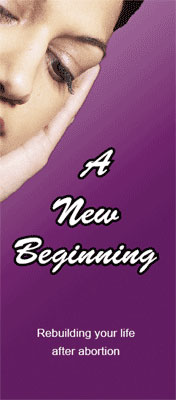A New Beginning
Editor’s Note: Please visit our home page for a full listing of abortion facts.
 You can rebuild your life after an abortion. You are hurting. Maybe it’s a vague ache deep inside. Or maybe your abortion left you emotionally drained and distraught. You are not alone. Many women are suffering as you are, yet some of us have been able to work through our heartache.
You can rebuild your life after an abortion. You are hurting. Maybe it’s a vague ache deep inside. Or maybe your abortion left you emotionally drained and distraught. You are not alone. Many women are suffering as you are, yet some of us have been able to work through our heartache.
Deeply buried emotions may erupt when you are the most vulnerable. The exact way you experience grief over the loss of your child will be unique to you. The point of crisis occurs most often between 2 and 5 years after the abortion. Yet, for some the crisis is immediate; for some it occurs 20 or 30 years later. But don’t despair, there is help.
Here are some of the possible symptoms of abortion trauma: low self-esteem, anger, guilt, anxiety, depression, sleep disorders, extreme mood swings, a need to compensate for the loss of your child, drug and alcohol abuse, promiscuity, frigidity, hatred of yourself or of men, withdrawal, an inability to sustain intimate relationships, unexpected emotional outbursts, suicidal feelings (especially on the date your baby was due to be born).
Don’t trivialize your grief.
Your grief is a healthy sign – a sign that you are facing realities. Your tears will help cleanse you. The first step toward being healed of emotional wounds is to admit that they exist and admit where they come from. You have a right to grieve. If you lost your child in an accident or miscarriage, everyone would expect you to grieve. You may be surprised to find yourself grieving over the loss of your child, since it was your voluntary choice. You may be told by your doctor, boyfriend, or by “family planning” personnel that you shouldn’t grieve – and this may make you feel even more foolish, selfish or guilty for the feelings you experience.
Your grief is not only real, it is normal. When you become pregnant, your body undergoes changes. Your body and your mind prepare for the birth. Abortion stops this natural process. It greatly disturbs your mental state. After an abortion, it is normal to experience a sense of loss, emptiness and grief. It is important for you to realize that you are responding as you should to a tragic life experience. The fact that you contributed to the abortion only increases your need to grieve.
Don’t be too hard on yourself.
You made a very important decision at a time when changes in your body made decision making very difficult. Others around you probably helped influence you to make the decision you did. Your parents, your boyfriend, and your friends probably all had their effect on your decision. You may have made an earnest effort to end their concern, embarrassment, pain, or anger. Your relatives, your superiors, or your best friend might have all suggested that abortion was truly an acceptable solution to your very difficult situation.
Counselors at a family planning clinic may not have given you enough information for you to make an informed decision. Maybe they didn’t tell you enough about the possible complications and even less about the emotional turmoil abortion causes. They told you little about the abortion procedure and nothing of the pain your child would suffer. It is likely that you did not make your decision based on adequate information.
Perhaps you thought abortion was “right” because it is legal. Usually you can trust the law as a guideline for conducting your life. It’s easy to see why you might not have realized how wrong abortion is. Your decision was tragic. It was regrettable. But, it may have seemed like the only possible solution at the time.
Forgive others.
It is natural to be angry with people close to you who should have been supportive at a difficult time in your life. But anger only develops into rage or bitterness. You cannot heal emotionally while allowing those destructive feelings to continue.
Maybe your child’s father felt trapped, with no way out. Perhaps he went back on every spoken and unspoken commitment he made to you. You have been generous to yourself, now be generous to him. Your relationship with your child’s father might end because of your abortion. But you need to forgive him for your own sake.
Forgive your parents, friends, and clergyman. They were wrong, but sincerely so. They thought they were doing what was best for you. Unfortunately their judgments were faulty. That’s a shame, but not a crime.
Forgive the health-care professionals if they failed to give you the necessary information that might have changed your decision. Many in the abortion field promote an opinion that an uninformed decision is a less painful one. You now know that’s not true, but it is in the past now.
Look to God.
Many women have said that they feel unworthy of God’s forgiveness. They feel that they are under God’s judgment. But read what God says:
For God so loved the world, that He gave His only begotten Son, that whosoever believeth in Him should not perish, but have everlasting life. (John 3:16)
Abortion is not just a misguided act or unfortunate decision. It is sin. Confess it to God as sin, and:
He is faithful and just to forgive us our sins, and to cleanse us from all unrighteousness. (John 1:9)
God is not angry. He knows all about your mistake. His Son, Jesus, has already given His life to pay for your sin and guilt. God stands with His arms outstretched, longing to soothe your hurting heart and heal your wounds. Don’t allow the enemy to tell you that your sin was too great, too selfish, or too destructive for God to forgive if you will just ask! If you don’t know Jesus as your Savior, Healer and Friend, then pray. Pray and let God know that you want to accept the forgiveness that Jesus earned for you on the cross. It isn’t about how fancy your words sound, it’s about what is in your heart:
Dear God, I know I have sinned by seeking my own way. Living by my own rules has resulted in death and torment for my child and me. Forgive me. Thank You for allowing your own Son to suffer the punishment I should have received and for dying in my place. I accept His great sacrifice on my behalf. I lay at your feet all of my feelings of guilt, grief, remorse and regret. Cleanse me and heal me by the blood of Your dear Son. Help me commit my life to you and to live according to your will. In Jesus’ name I pray. Amen.
Understand the grieving process.
You hope that one day your pain will cease – but how can this happen? And when? Learning what is happening to you will make it easier to cope.
The stages outlined below are general observations and will not necessarily be identical to your journey. You will grieve in your own way and at your own pace. Here are the stages of grief as they apply to you:
Relief
First, you may feel relieved after your abortion.
Denial and Rationalization
Then, somehow, that relief fades and you become troubled. This feeling is quickly covered over by not admitting what has happened. You make up reasons why you shouldn’t feel troubled: “It was something I had to do.” “It was just a blob of tissue.” “It’s legal, so it was okay.” These tactics rob you of the opportunity to be healed through grieving.
Realization and Shock
Now you begin to realize what really happened. It can be overwhelming and frightening. With a sense of bewilderment you may have said, “I killed my baby”. With this knowledge you may go back to the denial stage or you could move into the next and most painful part of the grieving process.
Anger and Depression
The full force of the abortion hits you. You feel angry, betrayed, grief stricken, or depressed. Thoughts of suicide may tug at you. Life may seem hopeless at times. Unexplainable rage, guilt, remorse or self-hatred may overwhelm you. You may suffer from insomnia, nightmares and flashbacks. You may drink, do drugs, or indulge in casual sex hoping to fill the emptiness inside. You regret your abortion and would give anything to undo it. Making decisions becomes difficult now. You think about your baby often. Don’t be afraid of these overwhelming feelings and thoughts. They are all a normal part of the process. Many women have had the same experience but they eventually worked through their pain. Now is a good time to seek God, and talk to an understanding minister, counselor or friend.
Acceptance and Surrender
With sympathetic help, a sense of peace and a proper perspective of your past emerges. For your healing to be complete you must seek and accept forgiveness for yourself. With God’s help you need to forgive others who had a part in the abortion. You need to surrender your anger, bitterness and self-hatred to Christ each day.
Hope and Substitution
As you stand before your Maker you must realize that it is His grace and His grace alone that has brought you this far. Don’t take credit for your healing. Christ does not call you out of your sin and heal your life so that you can enjoy the admiration of others. It is now your responsibility to serve the needs of others with the same compassion and grace that has been shown to you by the Lord. Your self-esteem returns when you go beyond focusing on yourself and into serving others.
The journey from grief to healing, is a long, painful process. It can also be a time of growth, maturing, and self-evaluation. By admitting and surrendering your feelings to God you will find release.
Undoubtedly you will always remember the child you never knew here on earth. The memory is not wiped away with the healing – only the tears.
… if any man be in Christ, he is a new creature: old things are passed away; behold, all things become new. (II Corinthians 5:17)
God loves you!
